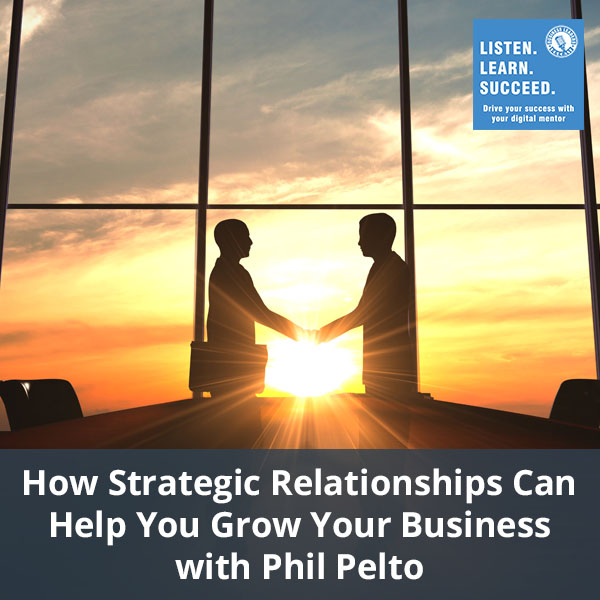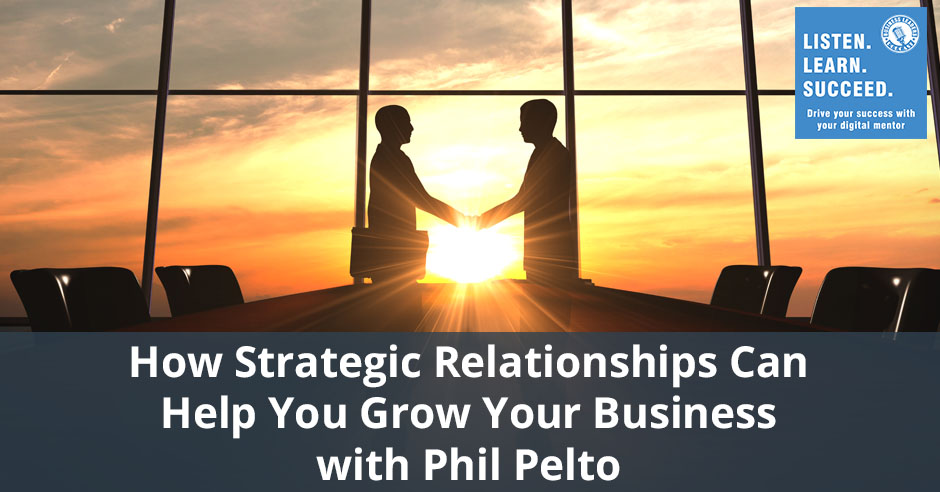How Strategic Relationships Can Help You Grow Your Business with Phil Pelto


Everybody can be successful if they want to be. With patience, persistence, and perspiration, you can accomplish anything. Successful networker and Chief Connection Officer of Firestorm in Denver, Colorado Phil Pelto helps people grow their business through relationships, strategic partnerships, and referrals. Firestorm is a business to business networking organization. They organize events and meetings for business people to meet, build relationships, and share referrals. He says no matter who their target market is, the goal is to help people grow their business. Phil shares a lot of what they’re doing and who they are serving from different industries.
—
How Strategic Relationships Can Help You Grow Your Business with Phil Pelto
We have Phil Pelto. He’s the Founder and Chief Connection Officer of Firestorm in Denver, Colorado. Phil, thanks so much for being on the podcast.
Thanks for having me.
Phil and I have a history. We’ve had breakfast together. We’ve talked about his networking efforts. He is an awesome networker and he’s built quite a business. Phil if you would, tell us about your business and who you serve.
Firestorm is a business to business networking organization. We organize events and meetings for business people to meet and build relationships and share referrals. The whole idea is to help people grow their business through relationships, strategic partnerships and referrals. The people that we serve are typically business owners that are still actively involved in the biz dev. I would say zero to $3 million in revenue, where they’re getting out and trying to grow their top line sales. We also have a good contingent of salespeople that work for larger organizations, the Comcast and CenturyLinks of the world, but are also going after business owners. The one thing both of those folks have in common is they are serving clients that are between $1 million to $50 million in revenue. We have all sorts of different industries. There are people that are doing the podcasting and phone systems and there are people that are doing digital marketing and websites and attorneys and CPAs and all that stuff. That’s our target market and the goal is to help people grow their business.
I was looking at your website and you had a lot of these groups up and down the front range. Can you describe the nature and the structure of each one of those separate units?
The nice thing about our organization is each one of those groups take sides on flavor, depending on who the core group of people is. What we’ll do is we’ll get a leader that has a business that it would behoove them to do this anyway. They would be out there looking for a group on their own and they decide that they want to run it. We have some good support structure in place for that. They will choose who they want to start the group with and they get to be a little bit selfish about it since it’s their group. They all say you’re in the exit planning and financial services business and so you would say, “Who are good partners for me?” We’d map out some good strategic partners and that would be the core group of people that we’d look for and then it expands from there. Depending on who the first person is, that will depend on the way the group grows and the makeup of the group going forward. It’s interesting. You can visit a chapter in Longmont and visit a chapter in Lone Tree and they are very different makeups, depending on who it was that started it.
We’re going to pretend I’m down in Colorado Springs and I want to open my chapter. Let’s go to the mechanics, your support level, expenses and that kind of thing.
We’ve been doing this for thirteen years now. Over the years I’ve been keeping notes and making manuals and becoming more sophisticated. We’re at the point where we have an online learning management system that we use. I’ve created a curriculum for the chapter president and for the chapter leaders and for the members and they’re all separate things. One of the benefits of starting a Firestorm chapter versus doing it on your own, which a lot of people are totally capable of. I would highly recommend doing it, whether it’s on your own or going with somebody like us. The end result should be the same. You’re going to grow your business with referrals and strategic partnerships.
I have taken a lot of headache off the table for you. We’ve got a lot of support. We’ve got a process for how to get things going and how to structure the group, how to support the group, how to add content and add value to each meeting. There’s a framework and structure to the meeting. As far as a cost goes, at some point in time, we will probably start charging. Right now, if you’re the group leader, we don’t have any initiation costs or set up fees. It won’t stay that way forever, but right now I’m a lot more interested in getting the right people in and making sure that that process goes smooth.
We’ll circle back around your growth plan.
There’s an incentive to be a leader because there’s not a cost associated with it. After that, we provide a lot of support. I want to make it as easy as possible for the chapter president to grow the group. If you wanted to start something in Colorado Springs, for instance, I would make a plan with you and say, “Here’s step one through ten and have a timeline to go along with that.” I would try and provide as much support through the process as I can.
In a typical group, is there a typical quantity of people that are in each one of these groups?
We capped them at 24. It’s a smaller group than some people are used to. I’m much more interested in quality over quantity and that’s one of the themes in our business both with the number of people in the groups and the number of referrals that get passed around. I’m much more interested in one deal that’s going to turn into something and be beneficial for my business than a pile full of so and so introductions.
There are a fair quantity of networking groups around. What makes Firestorm distinctive from many of the other networking groups?
The biggest differentiator for us is we’re focused on that business to business market. Most of the other organizations that are out there are a combo of business to business and business to consumer. They will accept any member, which is great. If you’re in a business to consumer role, there are a lot of options out there for you. For the person that’s selling to another business, it’s a more complex sale. It’s a longer sale cycle. There are other certain nuances to that whole process and the way that you build a partnership with someone, the product that you’re selling and the whole decision-making process. For the business to business salesperson, it doesn’t make sense for them to be in a group full of people that are selling, let’s say, Cutco knives or a guy selling suits. In those roles, I wasn’t necessarily able to help somebody that’s a management consultant or going after a larger more complex sale.
When you’re trying to build a relationship with somebody, you need to stay at the top of mind of that person.
How frequently do the groups meet?
The groups meet weekly. It’s a big-time commitment, but there’s a method to the madness. When we ask for that weekly commitment, part of that has to do with staying top of mind. If you look at how adults learn whether it be in college or continuing at or whatever, the reality is we forget half of the stuff that we hear 24 hours from now and another half, 24 hours after that. There’s a fairly short half-life on information. When we’re trying to build a relationship with somebody that I want to help their business or I want them to help my business, you need to stay top of mind of that person. If you do a monthly meeting or you do meeting every couple of weeks, if I missed one of those, I go four weeks, maybe eight weeks before I see that person again. I completely forget most of the information that I’ve heard at the last time I saw them. That’s one of the main reasons that we do weekly meetings is to stay top of mind with people. It’s nice to get in a routine, having the calendar to set appointments. It’s like going to the dentist. I don’t think about it, they send me a reminder card. It’s on the calendar.
What’s the typical length of the meeting?
It’s an hour and fifteen minutes.
Is there a typical structure within the meeting?
 Growing Your Business: I’m much more interested in quality over quantity, and that’s one of the themes in our business both with the number of people in the groups and the number of referrals that get passed around.
Growing Your Business: I’m much more interested in quality over quantity, and that’s one of the themes in our business both with the number of people in the groups and the number of referrals that get passed around.
Yes, absolutely. We’ve got an agenda. It’s the same agenda. There are certain things that happened during the meeting to help facilitate the relationship building process with people. To stay top of mind and to make sure that we’re reminded of things that can help each other out. If you run through the meeting agenda, we all do a quick intro and remind everybody what we do. At some point, people will think to themselves, “Why are we doing this? I know Bob. I know what you do.” You’ll think, “We should maybe skip that.” It’s fun to mess around with people if they say something like that and say, “Really? Bob, you’re going to do the introduction for the person to your left,” and see how they messed it up. It’s always fun exercise because we realize you get in the zone and you’re like, “That’s Bob, that’s Phil, that’s Susie.” You don’t listen to what they’re saying. That’s one of the first things.
There’s some chapter business type stuff. Things that are going on around. We talk about events. We try and vet other events that are going on around town and report back to our member base and say, “These are good. You should check these out. These are ones that are so and so,” and then stay away from those. We don’t talk about the stay away from, but we want to highlight the good ones. We highlight one member for the week. They get a chance to talk. There’s some curriculum around which presentation they’re going to give like Toastmasters. It’s different content but the same idea, where you have a presentation number one and you talk about this. Presentation number two and you talk about that. We do something called referral mapping. That’s where we go through and dive in deep for the person that’s featured for that week. We help them brainstorm and identify. It also helps the group here and remember who is their ideal client, who are good strategic partners for them?
What are the things that we could ask our clients or what are things that we’re going to hear when we’re out doing the course of business for our jobs? What do we hear that says, “That’s a great referral for Bob or I should make an introduction to this person?” We go through that and then we do target referral requests, which my wife and I did a quick video on in the car. The target referral request is a challenging thing for a lot of people because we ask people to bring specific names of people that they want to be introduced to. That means that you have to do some homework and come prepared with a list. What it does is it forces you to do it, which is the best part of the exercise and the most valuable. The second part is when you say it to somebody else, we zero in on things and I talked a little bit in the video about the reticular activating system. It makes you focus on one particular person, one particular name and whether you know that person or not your brain starts to think about how can I connect the dots? How can I find that person or find a way to get to that person, which is fascinating?
Back to pretending, I’m running my group and we’ve got somebody that’s caught wind or whatever and go, “I want to join your group.” What’s the process?
The first thing is to have them visit. We always want people to visit a couple of times for free. I don’t want there to be a huge barrier to entry at that point. We’re paying attention to that person. How they conduct themselves. Are they a good business person? Are they coming with the right intentions? Are they there to serve others or are they there to take for themselves? What do they do? Are they a good fit for the group? What kind of network are they going to bring to the table? What’s their background? There are all sorts of things that were keeping our eyes peeled for.
I would expect them to do the same. Are we as an organization, as a group, a good fit for what they’re trying to accomplish? At the end of the day, I’m trying to help people build long-term relationships. This isn’t a quick hit, come in, sell everybody at the group and leave or get fresh meat in so I can sell them and then kick them out the door. That’s not what we’re all about. I’m trying to build long-term strategic partnerships. I would love to see people be in the same group for a decade or two decades or more. There’s an interesting article, The Wall Street Journal put it out maybe 2010 or 2011. It was a group called the Wednesday Ten in New York. These guys have been meeting for 50 years. That’s what I want to create on a larger scale.
I think about that process and you have some plans because you have chapters all up and down the front range. You had chapters started in other towns. For the folks out there going, “This sounds interesting. I’d like to do one in my town.” What do they do?
The first step is to contact me. You can go to the website. There’s some information.
Let’s go ahead and do that. How do people find you?
The website is MyFirestorm.com and that’s the easiest way. You can shoot me an email, Phil@MyFirestorm.com. All of our information is on there. There’s a section on the website where it explains the process of becoming a member. Once a person visits, we sit down to have a conversation. There’s an application that they fill out and we interview them. There’s a little bit of process to get in because we want to make sure it’s a good fit. It’s a similar process for opening a chapter. I want to make sure that it’s the right fit for us and are the right fit for the person that’s going to run the chapter. Not everybody’s a good fit and we’re not a good fit for everybody. It goes both ways. We’ve got some preliminary information that you can check out in what’s expected and how the whole process goes for starting a chapter.
Everybody is capable of being successful.
There’s our chapter President’s agreement on the website so everybody can look that over before they decide they want to go any further. If it is a good fit and we decide that we want to do that then there’s again an application process and then we would have a conversation and start the planning process for that group. From start to finish to get a chapter, from nothing to first meeting, it’s probably a couple of months to do that. After that from the first meeting to a thriving chapter, I would say it takes a year to eighteen months to get it up and running. We’re playing the long game. You’ve got to have that long-term focus and you’ve got to have the wherewithal mentally with your business to not need to get immediate deals out of it. I’m not selling the get rich quick scheme, “Come to me and we’re going to grow your business 30% next month.” That’s not our jam.
They’ll find you on LinkedIn as Philip Pelto.
Firestorm is on LinkedIn as well, @MyFirestorm and all of the social media stuff.
I was on your site and you do video vignettes. Tell us about you as a TV star, you and your wife.
We do these member-of-the week videos like this. I like to highlight our members and chat with them. They’re short, they’re five minutes long. It’s a quick little snippet of information on one of the members. We do that every week and we also have some educational videos that we do. Part of my goal is to help people become better networkers. Help people be better at building relationships and understand that whole process and the nuances to it. We put out some content about that. We did this Firestorm Fridays thing. It might come back by popular demand, I keep getting asked. There’s always a fireplace or an open fire or something around in the background. It’s a little fun chat around that. There are quite a variety of videos that we do.
I was intrigued because it’s you or your wife doing the interview. What’s been the reaction of your guests to be interviewed by you?
 Growing Your Business: We’re playing the long game. You’ve got to have that long-term focus and the wherewithal mentally with your business to not need to get immediate deals out of it.
Growing Your Business: We’re playing the long game. You’ve got to have that long-term focus and the wherewithal mentally with your business to not need to get immediate deals out of it.
They enjoy the interaction. A lot of them have used the content to post on their LinkedIn pages and profiles or to put in on their website or use as a little marketing piece. Everybody likes it and it’s super short and fun. At least, that’s what I hope it is.
Shifting gears a little bit, some of the stuff that folks want to know is perhaps a book or an influential book that’s altered your perception or contributed to your perception of being a business owner as you go?
There are a ton of good books out there. A couple that I have finished that are fresh in my mind that are good. One is Tribes by Seth Godin. It’s particularly poignant for my business because that’s what we’re doing is building these tribes. I’m building a tribe and I’m helping other people build tribes. I enjoy the face to face interactions with people. There’s not enough of that in the world now. That was a good book. Ryan Holiday has The Obstacle is the Way and Ego is the Enemy. Both of those were good books and short reads, which is good for me because I have a short attention span.
Looking back over your time whether it was in the apparel industry or Cutco or Firestorm. Maybe a failure or maybe something wasn’t quite as successful that’s happened to you, that served you going forward made you the success that you are now.
There’s this story that I always like to tell that was a particularly painful lesson at the time. I would remember it because it was terrible. I was 22 and I was running my Cutco office in Northern Minnesota. For anybody that knows where Duluth is, it’s right on Lake Superior. It’s a small town with a heavy college population. A great place to run a Cutco office because you recruit high school seniors and college freshmen. I decided one year that things were going well. If you lived within an hour radius from Duluth, you were going to know about Cutco. You were going to know who I was and you were either going to work for me or tell me that you didn’t want to work for me, but you weren’t going to not know about me. We had a hefty marketing plan. Back in the day, this was 2002, the tried and true ways to recruit people were direct mail and we did flyers on people’s cars. Little post note stickers and then we did signs tied to a telephone pole and newspaper ads. Those were the three ways to go.
They were not that expensive. The direct mail was the most expensive and still wasn’t bad. I decided that I was going to get creative because I’m a creative cutting-edge guy. I wanted to be on radio, TV and the movie theater ads because where do high school seniors and college freshmen hang out? They go to the movies. I was on the radio, I was on TV and I was in every movie that you saw, before the movie there was a 60-second commercial. I spent $80,000 in about six weeks. I’m cutting a check for that whole summer blitz. I had four full-time receptionists to answer the phone. At the end of the summer, I look back on our numbers and we the best summer ever. It’s crazy. Of all the electronic media, the radio, TV and movie theater ads, we took three calls the entire summer. It was terrible. I complain to my dad one time and I don’t think he exactly knew what to say but he said, “That’s tuition in the school of life.” I was like, “Fair point.”
Thinking about your company message, if you could put an ad on the front page of the local business journal, what would it say and why?
Our tagline is forging B2B relationships. I would go with something short like that because people’s attention spans are short. We’re all about the relationship building. That’s what I want to promote both in my business and professionally and personally as well. There’s a lot of research and maybe it’s because this is what I’m interested in that I start to find these things. My reticular activating system is working for relationship-oriented stuff. I’m sure all the Google algorithms are pointing me towards these things. There’s a lot of stuff that I’ve been seeing that talks about how important relationship and personal connection is to longevity and living a long life and a happy life, and people feeling fulfilled. That’s the stuff that’s important to me. It helps your business and helps you be more successful and enjoy that success more. That’s what we’re all about is building those relationships. That will probably be it.
What’s the best allocation of either time or initiative that has helped Firestorm the most?
Patience, persistence, and perspiration is the way to be successful.
Going back to that relationship thing, we do a lot of different things. I like to do these videos. I like to create contents and write articles. I like to go out and do speaking events and get our name out there. I like to talk to anybody that will listen and go on podcasts and all that stuff. Honestly, the best allocation of time is spending time with other members, one-on-one. I did a survey. I sat down and interviewed all of our members and asked them how did they hear about us, and how’s it been going and what are things that we can do better? The pertinent piece of that for your question is everybody heard about us from somebody else. I guess that’s not surprising based on the business that they were in. The biggest bang for our buck is going out and talking with people and getting them to be promoters for what we’re doing.
Unusual habit or what others might consider out of the ordinary that’s helped your company the most and why?
The crazy thing that I do, I’m an ultrarunner so I go out and run. The longest run I’ve done so far is a 50-mile race. I’ve done a couple of those in the mountains. I did the Silver Rush 50 miler, which is up in Leadville. You start at 10,000 feet and then the whole thing is above 10,000 feet. Even I think that it’s a little insane, but I’m fully addicted now. I would say that that helps our business because I get a lot of thinking time. When you’re out in the woods by yourself running for twelve hours, it gives me a chance to clear my head. Also, there are a lot of benefits to be had in staying physically fit when you’re running a business. It helps you keep mentally sharp and keep on top of things. That’s definitely one of the crazier things that I do that other people just roll their eyes about.
Over the past few years, what belief or protocol have you established in the company that’s most impacted the success of the company?
 Growing Your Business: There’s this perception that you’re on an island and it’s lonely at the top. That is only true if you make it true or you want it to be true.
Growing Your Business: There’s this perception that you’re on an island and it’s lonely at the top. That is only true if you make it true or you want it to be true.
There are a couple of things. I believe that everybody can be successful if they want to be. I believe that about myself. I’m capable of doing anything. I honestly believe that about anybody else, whether or not they want to or whether they’re going to put in the work to do it, that’s a different story. Everybody’s capable of doing it. Part of that belief leads me to be, some might call, stubborn but I will say perseverant. He talks about patience, persistence and perspiration, and with those three things, you can accomplish anything. I definitely am persistent and that’s what caused me to be successful with all my other sales gigs. It’s the only thing that’s helped us survive for the last thirteen years with Firestorm. I like to preach that message across the organization. Other people will buy into that. If they do buy into that, if they believe that patience, persistence and perspiration is the way to be successful and that’s a good thing, then they’ll stick around and we perpetuate that message.
That’s better than saying you have to have a magic wand because not everybody has a magic wand or a specific skill set. What advice might you offer to a new CEO that’s assuming the role for the first time?
It’s never as easy as you think it’s going to be. It’s never sexy either. There’s a lot of stuff. Get around other people. There’s this perception that you’re on an island and it’s lonely at the top. That is only true if you make it true or you want it to be true. There are so many other people out there that are in the same situation. I love hanging out with other business owners and other CEOs, and other people that are getting it done. I spend a lot of time in my own head, running in the woods for twelve hours or sitting at my desk banging out emails. You start to second guess yourself and think that everybody else knows something more, knows something different, or doing a better job. It’s not easy to talk about it with other people because you’re supposed to know everything. You’re the guy running the show or the gal running the show. You’re supposed to know all the answers and that’s not the case. It’s good to be around other business owners and other people that have the same weight on their shoulders. Find yourself a support group.
Most common misconceptions about your role as business owner or chief connection officer?
The common misconceptions are that it’s easy and you sit around, and you drink beer with people, and you go out and you socialize and you have lunch. It’s all happy-go-lucky stuff. There’s no effort that goes into it. No rhyme or reason. Somebody has it like, “You’re built for that or you were born that way or you’ve got a knack for that.” There’s skill. You’ve got to study. You’ve got to hone your craft.
Over the past few years, what should you have said no to and why?
I should have said no to a job. I took it because it sounded cool and it sounded like there was a lot of potential. I realized that I’m unemployable. I don’t have the mindset to be a good worker. That doesn’t mean that I’m lazy by any stretch or I don’t want to be successful. I need to do things on my terms. I didn’t do it and I should have. I should have said no to that.
In the day-to-day operation of your company, in the role of CEO, what’s your personal habit or self-talk dialogue that keeps you focused?
They say 80% or 90% of your self-talk is negative. Keeping that in check is a big challenge. I have a personal mission statement and I love positive affirmations. It’s funny because a lot of people, including myself, at certain times have thought this is total garbage. Why would you do that? It’s not like the Stuart Smalley’s, “I’m good enough. I’m smart enough, I’m doggone it and people like me.” It’s like that but there’s more to it than that. You’ve got to change your habits and your behaviors and then you can change your thinking and then it changes your outcome. You’ve got to trick your head into doing certain things. To answer your question, I want to be a positive impact on everybody I come in contact with and help as many people as I can. That’s my personal mission in life. There’s a little card that I carry around with me and it says that and then I have another paragraph of things. One of the things that stand out is to talk only progress, talk only prosperity and talk only positivity. Those are the things that I refer back to if I’m not in a good spot.
It sounds simple and you pay attention to media, the 24/7 stuff over the internet. You go, “It’s a concerted decision to stay on that lane.”
It is because it’s so easy to get pulled off and to think that things are not going well or whatever. There are so many external things that are getting thrown at you that are not positive. It’s a challenge to stay on the path.
Keep your self-talk in check because 80% to 90% of it is negative.
What’s a quote that you find meaningful or use frequently?
One that is very pertinent to our business is a Zig Ziglar quote. He says, “You can have anything in life that you want if you first help enough other people get what they want.” I try to practice that. I try to teach other people how to do that. It’s tough. It’s the long game. It’s hard to stay true to that especially when maybe you are getting to a point where you feel like, “I’ve been doing all this stuff for other people and when am I going to get mine?” Especially if it’s been years.
You feel like a sponge. They’ve squeezed everything out of me that they can get.
I don’t know that I’m right. I hope that I’m right and I hope that Zig was right, but I’m never going to change. I’m going to keep helping other people. I don’t expect to be Jeff Bezos-rich but I feel good about the things that I’ve done for other people in my life and will continue to do it.
If I was to talk to your colleagues and ask them what you’re best at, what would they say and how do you utilize it on a day-to-day basis?
 Growing Your Business: If you could match up your job or career with what you’re meant to do, it would be amazing.
Growing Your Business: If you could match up your job or career with what you’re meant to do, it would be amazing.
Other people would say that I’m good at building rapport with people and being a social chameleon, which goes hand-in-hand. That served me very well over the course of my life. I grew up pretty poor. I didn’t interact with people that had money or had any pedigree. When I got my job selling knives, I had to get referred outside of my warm market because my market couldn’t afford what I was selling. Even more so when I got the job selling suits. I was selling suits that were thousands of dollars each. I didn’t spend $1,000 on my first car. It made me get out of my comfort zone and talk to people that I wasn’t comfortable talking to. What I realized is people are just people. No matter what socioeconomic background they have or where they’re at right now in life, people put their pants on one leg at a time. They have the same habits and thoughts and sense of humor and stuff. It’s some of them make different choices and decide to work harder or take risks. That was always fascinating to me. I tend to be able to build relationships quickly with people and that’s been cool.
There was a point where you decided to leave home and come to Denver and somewhere start Firestorm. Take us to that thought process on why you decided to start Firestorm.
You’ve got to go back far and there was always something. I did not grow up with financial means. A lot of the people that I hung around with were not entrepreneurial. They were stuck in their ways and they were like, “I’m going to get a job at this bar and I’m going to work there for the rest of my life. That’s where it’s going to be.” I have to credit a couple of my friends’ parents, as well as a number of teachers with introducing me to some different ideas about what was possible. At some point, I was maybe in second grade or third grade, where I got this entrepreneurial bug. I started selling fireworks on the playground. If you needed stink bombs or smoke grenades or something like that, I was the guy to see. I’m not sure where that came from. It turned into becoming more interested in business type things. When I was in high school, I read a couple of books. I bought Carlton Sheets real estate course, CD set, and everything when I was sixteen. I got interested in that and was going down that path where I’m like, “I’m going to have my own business someday.” That seems like the path for me.
People are just people no matter what socioeconomic background they have or where they’re at right now in life.
Then life happens and you get pulled down these other roads. You see dollar signs and for me, that was a new experience. I didn’t have money and then I got a job selling Cutco and I was like, “I can make a ton of money doing this.” Then I started doing other sales jobs. I abandoned the entrepreneurial path for a little while. Although that was entrepreneurial. I was an independent contractor doing my own thing, but it wasn’t my business. I was a rep for Cutco. It always stuck with me and when I started Firestorm with my buddy, Chris, we did it in the beginning to control our prospecting. He owned a title company at the time and I was selling suits. We did it to have control over that process and we weren’t happy with the other options that were out there. I got out of the suit business in 2009. I was figuring out what was next. What do I do? Do I go find another sales job? 2009 was not the best time. March of 2009 is not the best time to be looking for anything because the market got crushed and everybody was still reeling from that.
I was like, “I’ve got a little bit of a cushion that I had from selling for the last number of years. Let’s do it and see what happens.” I’m an analytical person. I ran through a lot of ideas and ran the business model out. I thought, “Is this the right choice for me or I’m going to throw my money down the drain?” I decided to get after it. It was a good fit with what I wanted to do personally and get out of my work. It was interesting because I had gone back to college because I didn’t finish when I was younger. I was making too much money for that. I couldn’t be bothered with college. I went back when I was 27. I took a class because I went to a liberal arts college, Lutheran University. I took a class about vocation and matching up your job and your financial, your career, your profession with what you’re meant to do. If you can get those two to match up, it would be amazing. That was about the time I took that class that I decided Firestorm’s the thing for me.
It’s interesting when people decide and they decide to go down a particular path and to explore the thought process. What brought you there? What kind of work did you do? What was your background? People that say, “I always want to own my business,” have no idea until they own one. Phil, I can’t tell you how much I appreciate you taking time to be on the show. Thanks for sharing.
Thanks for having me.
Links Mentioned:
- https://www.MyFireStorm.com/
- Firestorm
- Phil@MyFirestorm.com
- Philip Pelto on LinkedIn
- @MyFirestorm on LinkedIn
- Tribes
- The Obstacle is the Way
- Ego is the Enemy
About Phil Pelto
 Philip “Coach” Pelto is passionate about teaching and coaching and loves to see his friends and clients grow and succeed. As a salesperson, he quickly learned that building relationships and working from referrals was the best way to go. With MyFirestorm he is able to spread that idea far and wide. MyFirestorm works with other business owners and “rainmakers” that are frustrated with the old school ideas of smile and dial or quote and hope. MyFirestorm teaches its members how to build long term strategic partnerships and how to build a solid network of contacts that will send you a steady flow of high-quality referrals.
Philip “Coach” Pelto is passionate about teaching and coaching and loves to see his friends and clients grow and succeed. As a salesperson, he quickly learned that building relationships and working from referrals was the best way to go. With MyFirestorm he is able to spread that idea far and wide. MyFirestorm works with other business owners and “rainmakers” that are frustrated with the old school ideas of smile and dial or quote and hope. MyFirestorm teaches its members how to build long term strategic partnerships and how to build a solid network of contacts that will send you a steady flow of high-quality referrals.
To quote another great networker, “If I had to name the single characteristic shared by all truly successful individuals, I’d say it is the ability to create and nurture a network of contacts.”
-Harvey Mackay-
Specialties:
- Networking
- Public speaking
- Making strategic connections
- Coaching & Training
- Business Development
- Prospecting
- Recruiting
- Management
Love the show? Subscribe, rate, review, and share!
Join the Business Leaders Podcast Community today:
- businessleaderspodcast.com
- Business Leaders Facebook
- Business Leaders Twitter
- Business Leader LinkedIn
- Business Leaders YouTube
The post How Strategic Relationships Can Help You Grow Your Business with Phil Pelto appeared first on My podcast website.